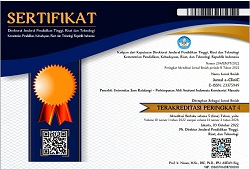Faktor Individu dan Pekerjaan yang Berhubungan dengan Kejadian Infeksi Corona Virus Disease (COVID-19) pada Pekerja di RSUP Ratatotok Buyat
DOI:
https://doi.org/10.35790/ecl.v11i1.44312Abstract
Abstract: COVID-19 infection in hospitals can be caused by a variety of individual and work related factors. This study aimed to analyze the relationships of individual factors and occupational factors with COVID-19 infection among workers at RSUP Ratatotok Buyat. This was a cross-sectional and quan-titative study, carried out at Ratatotok Buyat Hospital in July-August 2021. Total samples were 113 respondents. The instrument used was a valid and reliable questionnaire. Univariate analysis was presented in tables of frequencies and percentages. Bivariate and multivariate analysis used binary logistic regression test. The results showed that majority of respondents were female (68%), aged 15-34 years (70%), had DIII and DIV education (54%), working duration of 0-8 hours (63.7%), and had a history of two vaccines (94%). There were relationships between COVID-19 infection and non-adherence to wearing masks (OR=26.0 CI95%=[8.9–75.4]); abnormal BMI (OR=27.7 CI95%=[9.6–80.0]); presence of comorbidities (OR=31.3 CI95%=[10.6–92.0]); relatively recent tenure (OR=2.6 CI95%=[1.1–5.8]); and working in a medical area (OR=7.4 CI95%=[3.0–18.0]). Comorbid was the most dominant factor affecting COVID-19 infection (OR=42.1 CI95%=[4–445.3]). In conclusion, non-adherence to using masks, abnormal BMI, comorbidities, relatively short duration of working, and medical work units have a positive relationships to increase the risk of COVID-19 infection with the most dominant factor influencing is a history of comorbidities.
Keywords: COVID-19 infection; healthcare workers; hospital.
Abstrak: Infeksi COVID-19 di rumah sakit dapat disebabkan oleh berbagai faktor terkait individu dan pekerjaan. Penelitian ini bertujuan untuk menganalisis hubungan antara faktor individu dan faktor pekerjaan terhadap infeksi COVID-19 pada pekerja RSUP Ratatotok Buyat. Jenis penelitian ialah kuantitatif dengan desain potong lintang, dilaksanakan di RSUP Ratatotok Buyat pada bulan Juli-Agustus 2021. Sampel penelitian berjumlah 113 responden. Instrumen penelitian menggunakan kuesio-ner yang valid dan reliabel. Data dianalisis secara univariat disajikan dalam tabel frekuensi dan persentase. Analisis bivariat dan multivariat menggunakan uji regresi logistik biner. Hasil penelitian menunjukkan bahwa responden paling banyak berjenis kelamin perempuan (68%), berusia 15-34 tahun (70%), berpendidikan DIII dan DIV (54%), durasi kerja 0-8 jam (63,7%), dan riwayat vaksin dua kali (94%). Terdapat hubungan antara infeksi COVID-19 dengan Tidak patuh menggunakan masker (OR=26,0 CI95%=[8,9–75,4]); IMT tidak normal (OR=27,7 CI95%=[9,6–80,0]); adanya komorbid (OR=31,3 CI95%=[10,6–92,0]); masa kerja yang relatif belum lama (OR=2,6 CI95%=[1,1–5,8]); dan bekerja di area medis (OR=7,4 CI95%=[3,0–18,0]). Faktor komorbid paling dominan memengaruhi infeksi COVID-19 (OR=42,1 CI95%=[4–445,3]). Simpulan penelitian ini ialah penggunaan masker yang tidak patuh, IMT tidak normal, riwayat komorbiditas, masa kerja belum terlalu lama dan unit kerja medis memiliki hubungan positif meningkatkan risiko terhadap infeksi COVID-19 dengan faktor yang paling berpengaruh meningkatkan risiko ialah riwayat komorbid.
Kata kunci: infeksi COVID-19; pekerja fasilitas kesehatan; Rumah Sakit
Downloads
Published
How to Cite
Issue
Section
License
COPYRIGHT
Authors who publish with this journal agree to the following terms:
Authors hold their copyright and grant this journal the privilege of first publication, with the work simultaneously licensed under a Creative Commons Attribution License that permits others to impart the work with an acknowledgment of the work's origin and initial publication by this journal.
Authors can enter into separate or additional contractual arrangements for the non-exclusive distribution of the journal's published version of the work (for example, post it to an institutional repository or publish it in a book), with an acknowledgment of its underlying publication in this journal.
Authors are permitted and encouraged to post their work online (for example, in institutional repositories or on their website) as it can lead to productive exchanges, as well as earlier and greater citation of the published work (See The Effect of Open Access).







